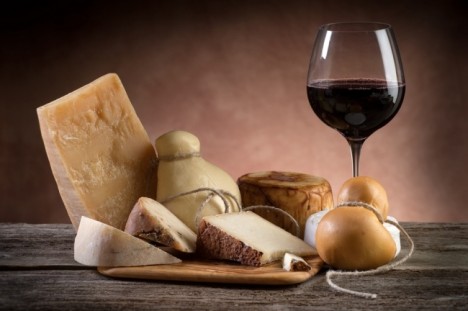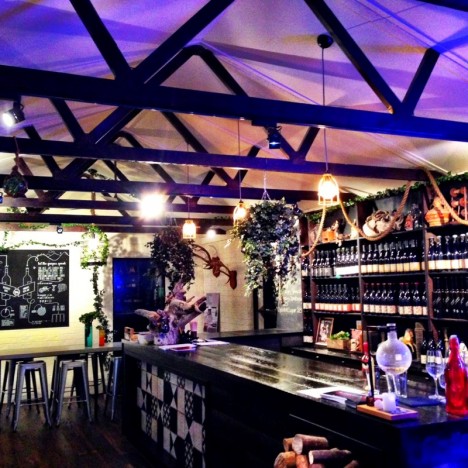This is a post that is probably going to introduce many of you to a trend that is very new, and yet as old as the hills. It’s become a pet subject of mine lately. My efforts to take eating and drinking back to no-brainer basics has seen me head here. Ditto my efforts to get back to a more basic, robust, real way of life.

I’m hoping by the time you get to the bottom you’ll be equally intrigued. So do natural wine enthusiasts Mike Bennie, a wine journo and organiser of natural wine events, including the Sydney Rootstock festival, and Richard Harkham, Hunter Valley natural winemaker and the producer of this natural wine documentary, who I’ve co-opted to pipe in with their pithy insights along the way. OK, let’s pop a cork…
What is natural wine?
Good question, no straight-forward answer. I’d describe it as “minimally fiddled with”. Or the equivalent of using pure rosehip oil as a moisturiser (one ingredient, no fuss, no added bits), or of using a glug of olive oil and a squeeze of lemon juice as your salad dressing…get the drift?
It’s keeping things as simple as possible and as close to the ancient practice of squashing some hand-picked grapes in a vat.
Mike adds that it’s a bit of an umbrella term that can describe completely unadorned wines (quite literally hand-picked and squashed grapes) from biodynamic vineyards made with minimal intervention and put to bottle without sulphur. But it can also include wines a bit further up the fiddled-with spectrum – wines from sustainably farmed vineyards with some sulphur addition used to get wine to bottle. As a rule natural wines include most or all of the following tenets: sustainable and organic and/or biodynamic viticulture, hand-picking of grapes, no heavy machinery, low new oak usage (if at all), natural fermentation, no chemical or winemaking product additions, minimal (or no) sulphur use.
Richard sees natural wine as being like a naked body (“You can see all the blemishes”) and points out two interesting factoids:
- 1. This vagueness as to what constitutes a natural wine causes lots of arguments within the “movement”. [Indeed, note some of the conjecture in the emerging comments below – Sarah.]
- 2. The modern natural wine “movement” began as a backlash to the science and technology that’s led to a loss of identity and personality in wine.
Why natural wine?
There are a few things that appeal to me.
* It simplifies. It cuts out tools and processes and infrastructure. Less things mean less carbon miles.
* It eliminates or minimises the use of 58 additives currently legal in winemaking. Which means less hangovers and toxicness. Says Richard: “Adjustment such as adding acids, tannins, and enzymes, or adjusting colour are not the vibe in natural wine circles. Add nothing to your wine throughout vinification and your wine’s personality will be pure and honest to its place and time.”
* And in doing so, it means wine makers have to rely on high quality fruit (in the absence of intervention to make up for low-grade stuff). It means the grapes have to be cared for super well, to ensure they don’t attract disease. Says Richard, “There is no room for error. The grapes all need to be handpicked, the winery needs to be completely clean and sterile as the little bit of microbial infection will make the wine go bad and your winemaking needs to be spot on as there is no recourse.”
* From a philosophical standpoint, it brings less perfection to the equation. I love the “gamble” of trying a natural wine – you don’t know what you’re going to get because the wine maker hasn’t added stuff to ensure consistency. Having less perfection is very free-ing…it leads to life being more of a fun experiment and forces us to back off from disappointment.
* Also, it gets us down and grubby and organic with our food. Natural wines tend to be an “organic” experience. Like eating a rustic damper around a campfire. Or a hearty roast on a farm where the beast was killed the day before. Says Mike, “It brings winemaking and wine growing closer to nature.”
Natural wines might lack finesse, but I think less finesses is what we all seek these days.
* Mike adds that it brings a greater interest in the provenance of wine. And in sustainable practices. “It’s like knowing your eggs are free range, or your meat is organic and free range; wine should be sourced in the same way if you are eating or thinking this way.” Nice one!
* It gets us soulful and real. Richard made this lovely point: “We believe wine is alive and is a living being, we are sick of soulless wines manipulated and worked to the maximum. Let’s go back to nature, let’s forget about what science and numbers say, let’s go by taste and feel.”
Richard is passionate on this point: “My ultimate aim is to give you a clear connection in its purest form to the grapes, yeast, root, leaf, soil, rain, sunlight, stones, hail, wind, and all the events that happened in the year before, preserved in a bottle that can be taken anywhere in the world but will always take you back to its place of origin. Every time you add an artificial flavour you mask one of the natural flavours of the land and the soil.” Love this.
* It’s sustainable. It promotes practices that give back to the earth and don’t detract.
Organic vs natural?
Not all natural wines are organic or biodynamic. A natural wine is simply a wine that has been encouraged to change the state of the fruit on the vine to a liquid in the bottle – through wild yeasts to encourage that transformation – no additions or manipulations, and with minimal handling or interference in the winery.
The Wine Idealist added his thoughts in the comments below on this: There are many wines that I would classify as being natural, yet have been grown from conventional (ie. chemical) vineyards. Of course, there winegrowers are striving towards organics, and may use some biodynamic principals, but the fruit is not always organic, or biodynamic.
The deal with sulphites (SO2)
For me, I find less sulphites in my wine means less crappy, gnawing feeling in the morning and also less waking up in the middle of the night. Apparently we are all allergic to sulphur. Richard cites this I-don’t-recommend-this-at-home experiment: if you put a teaspoon in a cup and mix it with water, it doesn’t matter who you are, you will cough, choke or splutter. It’s just that some of us are more allergic than others. Asthmatics can’t have any sulphur. Others get bad migraines, rashes or really bad hangovers.
Mike adds this sad addition: “The more sulphur used, the less able the wine is to show its full potential. Too much sulphur obscures fruit character and causes ‘reductive’ characters in which aroma and flavour are … depressed.”
This consideration from Richard is also interesting: “Sulphites are not bad per se , they come from the earth.” But he suggests reliance on them can mean a winemaker will allow mouldy grapes, unclean wineries or bad winemaking methods.
What about this orange wine business?
Yep, orange wines are, in fact, orange. They’re white wines that are fermented with the skin (white wines normally have their skins removed first) which sees them wind up an orangey colour. Why do such a thing? Well, as with red wine, it means theannin and other compounds can then lend character to the wine. Mike reckons, “they are usually very textural with light to firm chalky tannins, exotic perfumes and bright acidity. They can be very compelling wines driven by extracting all the ‘terroir’ information from grapes, and are particularly versatile with a breadth of foods.” There you go.
Orange winemaking is kind of on the “living in a yurt with a horse-drawn cart for transport” end of the spectrum.
As an FYI, Harkham wines is working on a “orange biblical wine project” right now where Semillon grapes are fermented in clay amphorae made to the same dimensions as ancient ones. “I am making this wine with no electricity like in ancient times as a green and anti-modernisation project”. Which makes a visit to his cellar door even more worthwhile, right?

As another FYI, his cellar door is open Mon-Fri by appointment and Sat-Sun from 10am-5pm.
Where and how to buy natural wines
Here’s a few tips I employ to scout out natural wines as often as possible. My approach is this: I want to support the industry and create demand!
* Every time I go out for dinner (here and overseas) I now ask if the restaurant has any natural wines by the glass (since I generally only drink one glass at a time). They might do, even if they don’t promote it.
* What I often find: staff are happy to even open a bottle from scratch and sell by the glass (if they don’t normally) because they are keen to sample it, too.
* I tend to choose restaurants that I now know have natural wines on the menu (from Australia and beyond):
- Fratelli Paradiso, Sydney NSW
- Water Under Moon (Builders Arms), Melbourne VIC
- Harkham Wine Cellar Door, Hunter Valley NSW
- Gourmet Life, Sydney NSW
- Chiswick Gardens, Sydney NSW
- Ester, Sydney NSW
- Four Seasons Hotel, Sydney NSW
- Hickson’s Food & Wine, Sydney NSW
- Icebergs Dining Room and Bar, Sydney NSW
- Love, Tilly Devine, Sydney NSW
- Monopole, Sydney NSW
- Neighbourhood Wine, VIC
- Peppers Mineral Springs Retreat, VIC
- Seddon Wine Store, Melbourne VIC
- Wildfire Restaurant, Sydney NSW
- The Tilbury Hotel, Sydney NSW
- 6 Mary Street, Sydney NSW
- Balthazar Restaurant & Wine Bar, WA
- Berowra Waters Inn, NSW
- Bentley Bar, Sydney NSW
- Bonds Corner Fine Wine, NSW
- DRNKS, Sydney NSW
- East Ocean Restaurant, Sydney NSW
- The Bathers Pavilion, Sydney NSW
- The George, QLD
- North Bondi Fish, Sydney NSW
- Vaucluse Cellars, Sydney NSW
- The Oak Barrel, Sydney NSW
- Australian Wine Centre, NSW
- Aria, Sydney NSW
- Billy Kwong, Sydney NSW
- Five Way Cellars, Sydney NSW
- Andrew Guard Fine Wines, NSW
- Fix St James, Sydney NSW
If you want to learn more, look out for wine writers such as Mike Bennie (!), Max Allen , Daniel Honan (the wine idealist), Alice Fiering and Andrew Jefford. Also, check out DRNKS.com. I read about Joel on Broadsheet and I love what he’s doing. They specialise in natural, sustainable and organic wines, and they bring the drinks to you!
Here’s a wine I personally recommend: biodynamic red wine (completely sugar free) from Ben at Blind Corner.
Please add names of places that you know support natural wines in your neck…

